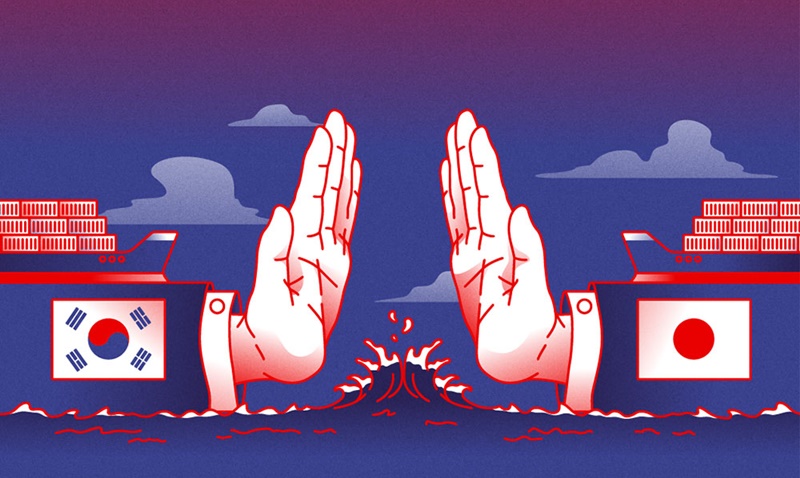
Korea's trade spat with Japan has continued to worsen since Tokyo imposed export restrictions on its neighboring country. (iclickart)
By Kang Gahui and Lee Jihae
After President Moon Jae-in announced on July 15 that Japan's export restrictions on Korea could damage the Japanese economy more, foreign media are paying closer attention to the trade spat between both nations.
The Japanese government and media have criticized President Moon's stance on the issue. Japanese Chief Cabinet Secretary Minister Suga Yoshihide said, "Japan's export curbs are based on national security reasons thus President Moon's criticism is inaccurate."
Japanese Minister of Economy, Trade and Industry Seko Hiroshige added, "We've consistently explained that Japan is not resorting to (economic) retaliation."
The Japanese daily Yomiuri Shimbun on July 17 said in an editorial, "The Moon administration's criticism of Japan was insensible," adding, "The Korean government should reexamine its trade regulation system first."
Chinese and U.S. media, however, have been more critical of Japan's stance.
The U.S. business network CNBC on June 16 said in an article, "The bad blood between the two Asian powerhouses is nothing new and dates back to Japan's colonization of South Korea in the early 20th century."
Jesper Koll, senior adviser to WisdomTree Investments, told CNBC that Japan's restrictions are more of a long-awaited "strategic" move rather than a short-term "political ploy."
The New York Times, in an article published on July 15 titled "Japan Cites 'National Security' in Free Trade Crackdown. Sound Familiar?" quoted Bryan Mercurio, an expert on international trade law at the Chinese University of Hong Kong, as saying, "If this (citing national security to justify cutting off trade) is used too often, there's a real potential to absolutely destroy the entire international trading system."
Gene Park, an expert on international political economy and Japanese politics at Loyola Marymount University in Los Angeles, also said in the article, "The really troubling thing about it is that it represents the increasing weaponization of these trade or economic interests to coerce another country over completely unrelated issues."
"Japan has a lot of legitimate grievances," he said, but added that trade measures are "not the right way to address them."
China's government-run Xinhua News Agency on July 17 said, "By citing the Korean Supreme Court's verdict on compensation for forced laborers and not upholding the agreement, Japanese Prime Minister Shinzo Abe revealed his true intention to no longer treat Korea as a preferential nation."
Xinhua also speculated that Abe's motive behind the action was to gain an edge in Japan's upper house election on July 21.
Another Chinese media outlet, The Global Times, said, "If there is a blow to Korean companies' semiconductor production, it will deal a blow to the cell phone production of Chinese corporations such as Huawei as well."
David Stilwell, U.S. assistant secretary of state for East Asian and Pacific affairs who is visiting Seoul for meetings with the Ministry of Foreign Affairs and Cheong Wa Dae, said, "The United States, as a close friend and ally to both, will do what it can to support their efforts to resolve (the trade row)."
kgh89@korea.kr